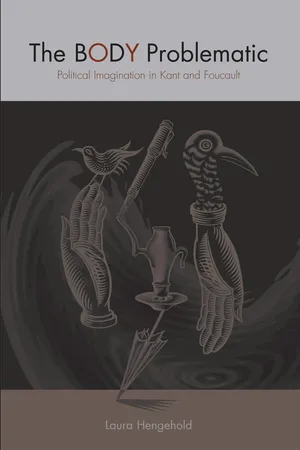
- 336 pages
- English
- PDF
- Available on iOS & Android
About this book
Late in life, Foucault identified with "the critical tradition of Kant," encouraging us to read both thinkers in new ways. Kant's "Copernican" strategy of grounding knowledge in the limits of human reason proved to stabilize political, social-scientific, and medical expertise as well as philosophical discourse. These inevitable limits were made concrete in historical structures such as the asylum, the prison, and the sexual or racial human body. Such institutions built upon and shaped the aesthetic judgment of those considered "normal."
Following Kant through all of Foucault's major works, this book shows how bodies functioned as "problematic objects" in which the limits of post-Enlightenment European power and discourse were imaginatively figured and unified. It suggests ways that readers in a neoliberal political order can detach from the imaginative schemes vested in their bodies and experiment normatively with their own security needs.
Frequently asked questions
- Essential is ideal for learners and professionals who enjoy exploring a wide range of subjects. Access the Essential Library with 800,000+ trusted titles and best-sellers across business, personal growth, and the humanities. Includes unlimited reading time and Standard Read Aloud voice.
- Complete: Perfect for advanced learners and researchers needing full, unrestricted access. Unlock 1.4M+ books across hundreds of subjects, including academic and specialized titles. The Complete Plan also includes advanced features like Premium Read Aloud and Research Assistant.
Please note we cannot support devices running on iOS 13 and Android 7 or earlier. Learn more about using the app.
Information
Table of contents
- Front Cover
- Copyright
- Contents
- Acknowledgments
- Introduction: Imagination and Problematization
- Part 1: The Political Topology of Kantian Reason
- Part 2: Man and His Doubles: Two Ways to Problematize
- Part 3: Locked in the Market
- Afterword: Not Similar to Something, Just Similar
- References
- Index
- Back Cover